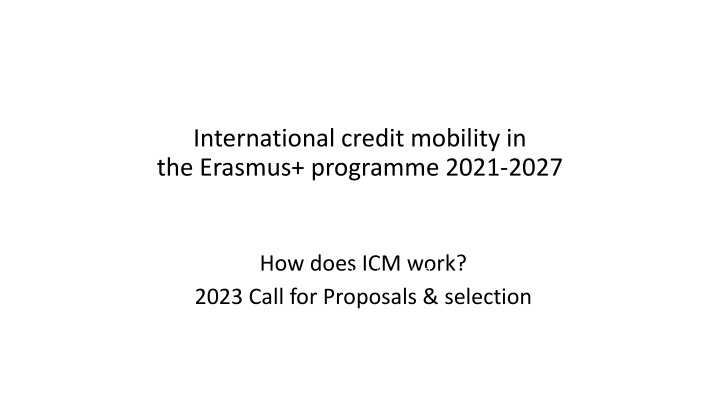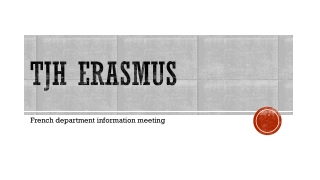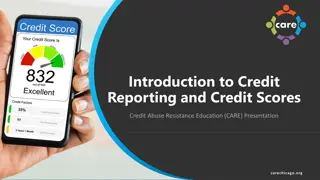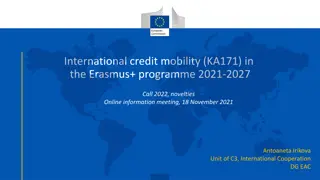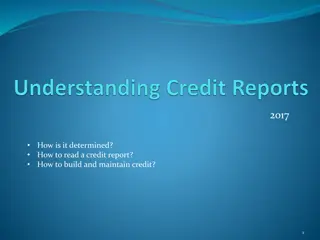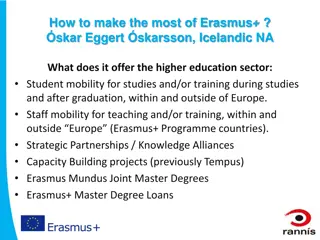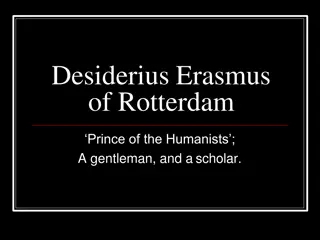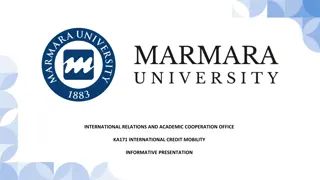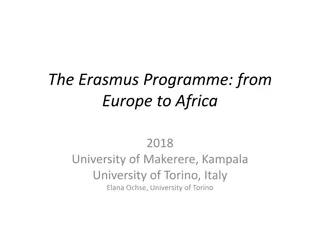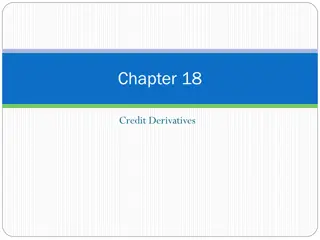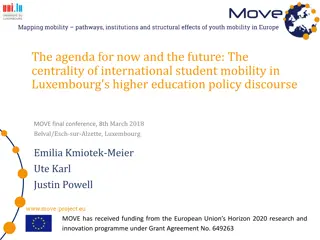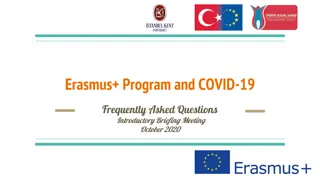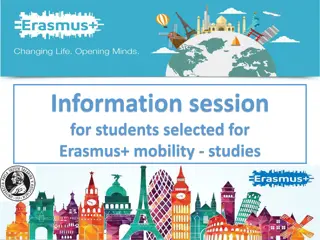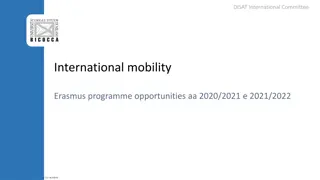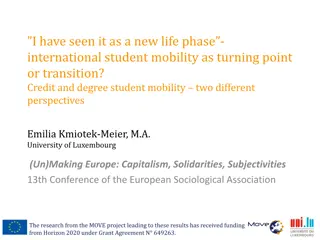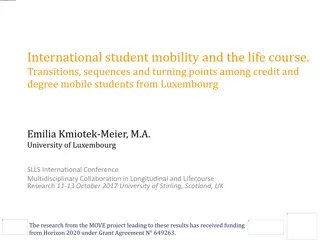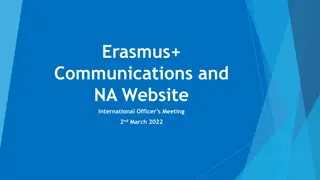International Credit Mobility in Erasmus+ 2021-2027: Call for Proposals & Selection Process
Erasmus+ programme 2021-2027 supports international credit mobility through various activities like short-term staff and student mobilities, blended mobility, and more. Learn about the budget allocation per region and activity supported in ICM projects.
Download Presentation

Please find below an Image/Link to download the presentation.
The content on the website is provided AS IS for your information and personal use only. It may not be sold, licensed, or shared on other websites without obtaining consent from the author.If you encounter any issues during the download, it is possible that the publisher has removed the file from their server.
You are allowed to download the files provided on this website for personal or commercial use, subject to the condition that they are used lawfully. All files are the property of their respective owners.
The content on the website is provided AS IS for your information and personal use only. It may not be sold, licensed, or shared on other websites without obtaining consent from the author.
E N D
Presentation Transcript
International credit mobility in the Erasmus+ programme 2021-2027 How does ICM work? 2023 Call for Proposals & selection How it works?
What is Erasmus+? The EU's programme to support education, training, youth and sport Funding for programmes, projects and scholarships Fosters EU-EU and EU-international cooperation Erasmus+ programme 2021-2027: builds on previous programme more international
International dimension of Erasmus+ 2021-2027 Programme countries => Member States and associated third countries Partner countries => Non-associated third countries
How does it work? International credit mobility 2014-2020 ~270k planned short-term staff and student mobilities Decentralised action managed by the Erasmus+ National Agencies based in the programme countries Global action: the world is divided into regions, which have different budgets allocated per year 40 Thousands 35 30 25 20 15 10 5 0 to Europe from Europe
ICM budget 2021-2027 2014-2020 Middle East 1% Pacific 1% Latin America 3% Caribbean Central Asia 2% Central Asia 4% Middle East 1% Asia 9% Asia 13% WB 19% WB 18% Industrialise d Asia 4% Latin America 4% Industrialise d Americas 4% 1% ~EUR 959 million ~EUR 1,064 billion SMED 17% USA & Canada 3% SMED 21% SSA 26% ACP 8% EaP 12% Russia 8% EaP 15% Russia 6%
Activities supported (I) Short-term higher education mobility for students, academic and administrative staff All levels: Bachelor, Master and PhD candidates Mobility in any subject or academic discipline Also supports traineeships for students and training for staff Study periods and traineeships of 2 12 months Blended mobility (physical mobility of 5 30 days + virtual component)
Activities supported (II) All partners in an ICM project can send and host students and staff as described in their submitted project and provided that a relevant grant has been secured. For certain countries, Bachelor/Master student mobility is only possible from third countries to Europe this means third country universities can send but not host. Countries with this restriction can be found in this list (Region 1 Western Balkans is exempted from restriction): https://www.oecd.org/dac/financing-sustainable- development/development-finance-standards/DAC-List-ODA-Recipients- for-reporting-2021-flows.pdf European partners may use a part of their intra-European mobility budget tofund their students mobility to restricted countries under ICM.
Organisational support EUR 500/participant Individual support EUR 700-900/month for students and EUR 140-180/day for staff EUR 79/day up to the 14th day of activity and EUR 56/day from 15th to the 30th day of activity in case of blended mobility Contribution to travel costs EUR 20-1500, depending on distance travelled
Who can apply and how? (I) Higher Education Institutions in the Programme countries The ICM project in their application contains the countries and partner universities they intend to cooperate with, as well as their cooperation plan in each region Partner Country HEI Programme Country HEI
Who can apply and how? (II) Upon successfully passing the established quality criteria, they will be allocated an ICM grant spread in different regional envelopes For every partnership with a secured budget, an Inter-Institutional Agreement is needed between the main applicant in Europe and every partner university in third countries before mobilities can start. Partner Country HEI Programme Country HEI
ICM project implementation Grant agreement signed with Programme Country HEI Participant reports on recognition Inter- institutional agreement signed Learning or Mobility Agreement signed Transcript of Records completed Fair and transparent selection process Mobility period Recognition
Timeline Publication of the call: 23 November 2022 Evaluation process: March - July 2023 Deadline: 23 February 2023 Information to applicants August 2023 Start of projects: 1 August 2023
More information Erasmus+ Programme guide Erasmus+ Call for proposals ErasmusPlus Facebook ErasmusPlus Twitter
